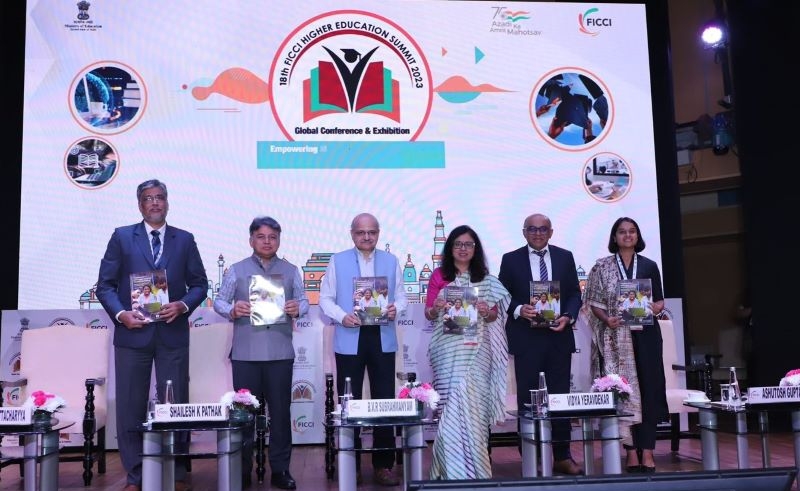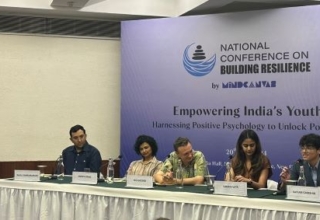
The 18th edition of ‘FICCI Higher Education Summit 2023’ spread on two days Nov 29-30 began in New Delhi with BVR Subrahmanyam, CEO, NITI Aayog delivering the inaugural keynote at its plenary on Day 1. Subrahmanyam spoke about the challenges before the country in the higher education capacity as in his estimate the current number of students in higher education from 4 crore in about 1200 universities and 44000 colleges will more than double by end of the current decade as 26 Crore students in country’s school system move up in academic career to undergraduate level.
NITI Aayog chief said country has seen good growth in number of HEIs from 20 universities to 1200 and 44K colleges from just 44 in 1947 but given growing aspirations of youth and country’s commitment to 50% GER in higher education, the additional capacity came come either through new universities or doubling the capacity of existing HEIs. Saying that more than 95% of higher education need and capacity lies with the states, and then given the fiscal stress on states, some of whom barely can just pay the salaries, the facilities and infrastructure augmentation and maintenance fall short of requirements. “Then how are we going to do it, obviously private sector has to play a key role but do it in the right way,” he added.
Saying that keeping reach in silos outside university system has cost the country, he said we need to bring back research to university system. He also spoke about the ecosystem and city culture that defines higher education aspirations in an enterprising mindset citing examples of Pune and Bengaluru where startup culture has impacted thought process and aspirations of students. “We need to be more innovative in the higher education sector. We need to focus on revamping the educational system so that the students are industry ready,” he emphasized.
Speaking on the youth, Mr Subrahmanyam further stated that students are the future of India and will play a key role during India’s journey in the Amrit Kaal. Universities will invariably play a huge role in developing the right thought process of the students. Subrahmanyam also asserted that there is a need to create more educational cities in India. He further urged the private sector to further expand the higher education eco-system in the country and ensure more international students are attracted to India along with encouraging domestic students also to study in India.
The Indian universities, higher educational institutions have a period of 25 years to exploit the potential of India’s demographic dividend, he added. He also gave the country a target of attracting half a million foreign students by 2047 saying that India has to become an international education destination. “We should become the global provider of education by improving our quality, brand value and improve our rankings which are globally recognized,” he said while defining the future vision of next 25 years.
In the same session, Ashutosh Gupta, Country Manager, LinkedIn India made a strong pitch for ‘Skills First’ mindset. While sharing insights about engagement on his platform, Gupta said that 73% student sign up for LinkedIn, which signifies how this generation of youth are seeing practical skills as a gateway to their own growth. He also made it known that nobody should get scared of AI as it is going to be a great tool and shape our future. It will take up things that needed hard skills therefore knowledge seeking behavior has to change to practical skills as well from holistic development to wholesome skilling.
Dr Vidya Yeravdekar, Chair, FICCI Higher Education Committee & Pro-chancellor, Symbiosis International University earlier in her welcome address said that the challenges in higher education sector requires a fresh look. She said while NEP 2020 feels our own, however, there are issues which are bogging down the sector. While referring to heightened emphasis on rankings, she said it has started affecting teachers as publishing researches has become a distraction and uninteresting for those who love teaching than research. Yeravdeka said those interested in academic careers for teaching should be given a pathway. Commenting on the new regulations allowing foreign universities, she said it has created both positive as well as negative vibes but seeing how difficult it is even for us to set up a campus in another state, I am sure it is going to be difficult for them as well, so a lot of welcome joint ventures looks a possibility.
Shailesh K Pathak, Secretary General, FICCI said that that our country’s future will depend on the productivity and skill-readiness of our youth and workforce. This in turn will depend on the quality and supply of excellent higher education, incorporating technological change. “The National Education Policy 2020 has a very effective blueprint for higher education in India,” he added. He also suggested that UPSC should drop the graduation criteria as it will help release a lot of youth who end up unemployed after wasting years to crack civil services.










